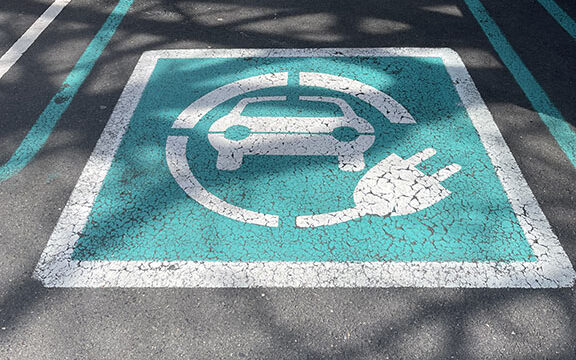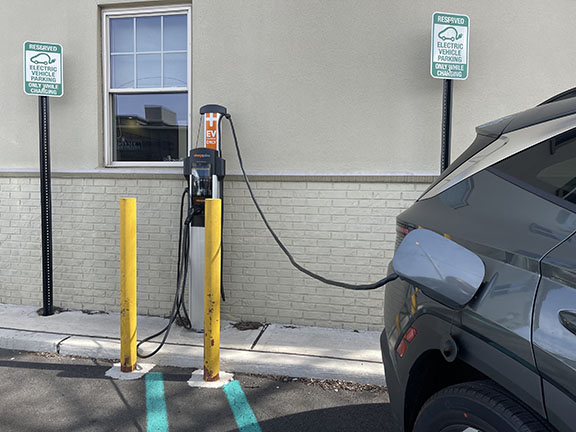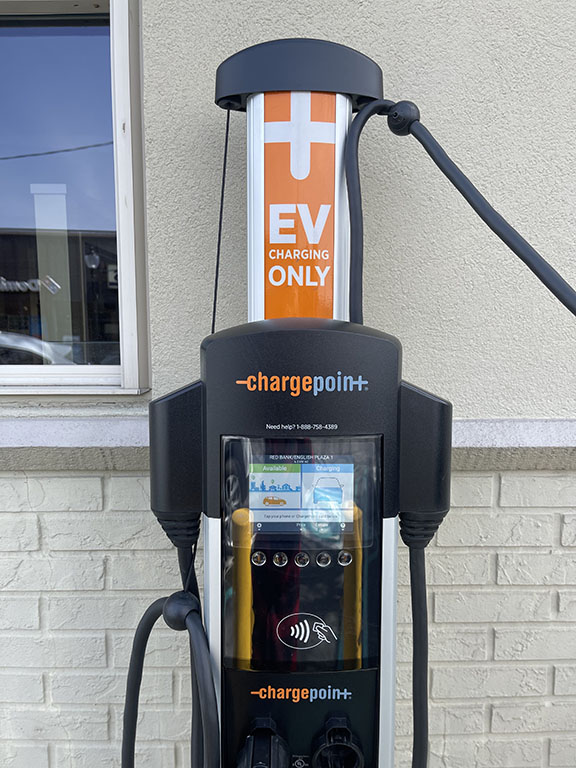
By Chris Rotolo
OCEANPORT – If inflation rates, a global health crisis and the threat of a world war weren’t enough to trigger your stress levels, the idea of “range anxiety” might just do the trick if you happen to own an electric vehicle, or are mulling over the notion of acquiring one.
“Range anxiety” can happen in a gas-powered vehicle, too, but the most modern connotation refers to the fear of having an insufficient charge in an electric battery, leaving the driver unable to travel the distance to their destination.
It’s a dread Gov. Phil Murphy hoped to quell in July 2021 when he signed into law a statewide electric vehicle ordinance, providing the state’s 565 municipalities a blueprint to prepare for an influx of electric vehicles. That was one stepping stone on his proposed path toward achieving 100 percent clean energy in the Garden State by 2050.
Murphy’s bill also served as the impetus for Oceanport to introduce an ordinance during the governing body’s March 17 meeting that would amend the borough’s land development laws to authorize and encourage businesses and organizations to provide electric vehicle supply and service equipment on site. It also supports pre-wiring parking spaces to facilitate an easier and more cost-efficient future installation of charging equipment.

“I wish we could say we introduced this ordinance because we’re a forward-thinking and environmentally-conscious community, which I believe we are, but also this is something that’s mandatory in all New Jersey municipalities,” Oceanport Mayor Jay Coffey told The Two River Times in a March 18 interview.
“I don’t have an opinion on electric vehicles one way or another. Apparently there’s something called ‘range anxiety,’ and some people experience it. With this ordinance, we’re making it a little more comfortable for developers to comply with what’s being imposed, and offering a way to get more publicly accessible charging stations to reduce any of those anxieties,” Coffey added.
Murphy signed the bill into law July 9, 2021 as a means to confront climate change and reduce transportation emissions, which, according to the office of the governor, account for more than 40 percent of New Jersey’s climate pollution.
“Making smart investments in our transportation infrastructure, such as encouraging electric vehicle charging infrastructure across the state, will help build a stronger, fairer, and greener New Jersey for generations to come,” Murphy said in a media release published Sept. 8.
The statewide mandate supersedes any other pre-existing ordinance related to electric vehicles a municipality may have adopted in an effort to streamline the development and installation process.
However, Coffey said time will tell if the statewide mandate proves to be a valuable endeavor.
“At the end of the day, the average Joe just wants to get from Point A to Point B in the most cost effective way possible. If at some point in the future someone can figure out how to make it more cost-effective to travel with a magic carpet, then we’ll all be buying magic carpets,” Coffey said. “The consumer always dictates the market. And when left to their own devices, the majority of consumers will do what’s best for them and their family.”
In 1974, when the Organization of Petroleum Exporting Countries imposed an embargo on the United States in retaliation for supplying the Israeli military, raising the prices of fuel to record highs, the International Energy Agency was founded to help industrialized countries navigate the situation.
According to the agency, which now tracks the global volume of electric vehicles in circulation, approximately 130,000 total electric vehicles were sold in 2012. A decade later, sales of these vehicles reach that mark in about a week.
The International Energy Agency said that growth in the market has been particularly noticeable over the last three years, “even as a global pandemic shrank the market for conventional cars and as manufacturers started grappling with supply chain bottlenecks,” clean energy technology analyst Leonardo Paoli and head of the Energy Technology Policy Division Timur Gul wrote in a Jan. 30 publication.
Paoli and Gul reported that, worldwide, 2.2 million electric vehicles were sold in 2019 and, though the overall market sales for cars declined in 2020, electric vehicle sales still increased to approximately 3 million. The trend continued in 2021 when electric vehicle sales more than doubled to 6.6 million.
There are phone applications, like PlugShare for iPhone, that offer public charging maps and an internet search can also turn up charging stations near a location. Some of the electrical vehicle charging stations already available in the Two River area include:
• Holmdel: 101 Crawfords Corner Road (Bell Works)
• Little Silver: 100 Oceanport Ave. (Contemporary Motor Cars)
• Middletown: 1447 Route 35 (Middletown Plaza)
• Red Bank: 90 Monmouth St. (Red Bank Borough Hall); 100 English Plaza; 23 Wallace St.; 120 Newman Springs Road (Nissan City of Red Bank)
• Tinton Falls: 700 Shrewsbury Ave. (George Wall Ford Lincoln); 702 Shrewsbury Ave. (Shrewsbury Volkswagen); 641 Shrewsbury Ave. (Circle Chevrolet); 1 Premium Outlet Blvd. (Jersey Shore Premium Outlets)
The article originally appeared in the March 24 – 30, 2022 print edition of The Two River Times.















